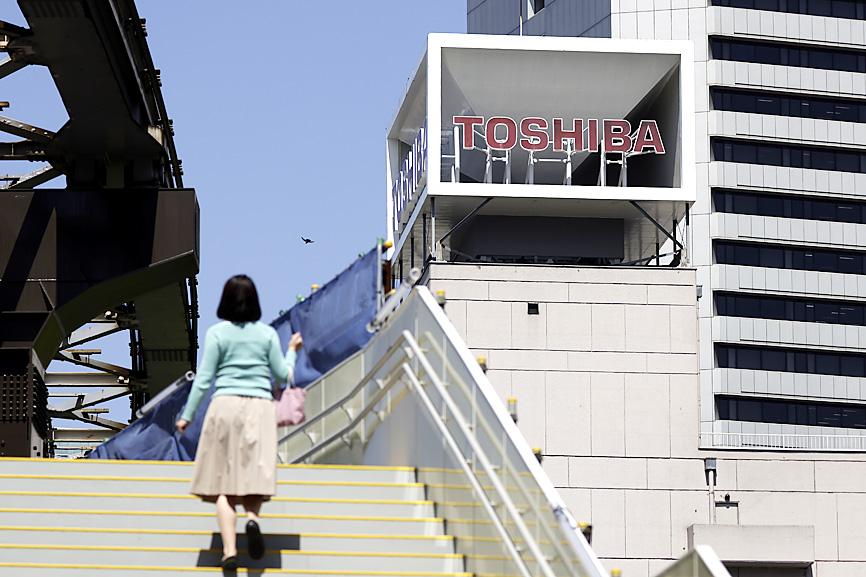Toshiba Corp is considering a buyout offer from a British private equity fund, it said yesterday, with reports suggesting the deal could be worth about US$20 billion.
Trading of Toshiba shares was halted on the Tokyo Stock Exchange at the open, after the Japanese company confirmed the offer in a statement.
Toshiba said that it “received an initial proposal yesterday” by CVC Capital Partners for a buyout.

Photo: Bloomberg
“We will request detailed information and carefully discuss” the offer, the firm added.
The Nikkei Shimbun said that CVC was considering a 30 percent premium over the Japanese industrial group’s current share price, valuing the deal at nearly ¥2.3 trillion (US$20.9 billion) based on Tuesday’s close.
It said that CVC would consider recruiting other investors to participate in the buyout.
CVC declined to comment on the matter.
The proposal would take Toshiba private, with delisting intended to produce faster decisionmaking by Toshiba’s management, which has clashed with shareholders recently, reports said.
The move, if successful, would allow the firm to concentrate resources on renewable energies and other core businesses, they said.
The two firms are not strangers — Toshiba CEO and president Nobuaki Kurumatani was head of CVC’s Japanese operations from 2017 to 2018, before he took the top job at the conglomerate.
Moreover, a senior executive at CVC Japan is currently an outside director on Toshiba’s board.
Kurumatani told reporters that “we received the proposal, but we’ll discuss it in a board meeting.”
Reports suggested the discussions were to begin yesterday, though Toshiba did not immediately specify.
Toshiba has been hit by false accounting scandals and huge losses linked to its US nuclear unit.
It was forced to sell its profit-making chip business to make up for huge losses.
Following painful restructuring, its earnings rebounded and the company in January returned to the prestigious first section of the Tokyo Stock Exchange.
Justin Tang (鄧文雄), head of Asian research at United First Partners, said that CVC’s representation on Toshiba’s board meant the fund was already “familiar with Toshiba’s assets as well as its inner workings.”
“Given the turbulence in Toshiba, the favorable interest-rate environment and supportive investors, the situation is right up CVC’s alley with their expertise in restructuring and turnarounds,” he said.
“They will, however, have their work cut out for them in regards to regulatory approvals,” Tang said.
Japanese Chief Cabinet Secretary Katsunobu Kato stressed the importance of due diligence given Toshiba’s large presence in Japan.
“Regarding companies that are important to our country’s society and economy, we think it’s crucial they can build and maintain a management system that allows them to continue stable operations,” he said.
The news sent Toshiba shares soaring yesterday and they finished up 18.3 percent at ¥4,530.

China’s Huawei Technologies Co (華為) plans to start mass-producing its most advanced artificial intelligence (AI) chip in the first quarter of next year, even as it struggles to make enough chips due to US restrictions, two people familiar with the matter said. The telecoms conglomerate has sent samples of the Ascend 910C — its newest chip, meant to rival those made by US chipmaker Nvidia Corp — to some technology firms and started taking orders, the sources told Reuters. The 910C is being made by top Chinese contract chipmaker Semiconductor Manufacturing International Corp (SMIC, 中芯) on its N+2 process, but a lack

NVIDIA PLATFORM: Hon Hai’s Mexican facility is to begin production early next year and a Taiwan site is to enter production next month, Nvidia wrote on its blog Hon Hai Precision Industry Co (鴻海精密), the world’s biggest electronics manufacturer, yesterday said it is expanding production capacity of artificial intelligence (AI) servers based on Nvidia Corp’s Blackwell chips in Taiwan, the US and Mexico to cope with rising demand. Hon Hai’s new AI-enabled factories are to use Nvidia’s Omnivores platform to create 3D digital twins to plan and simulate automated production lines at a factory in Hsinchu, the company said in a statement. Nvidia’s Omnivores platform is for developing industrial AI simulation applications and helps bring facilities online faster. Hon Hai’s Mexican facility is to begin production early next year and the

AVIATION BOOM: CAL is to renew its passenger and cargo fleets starting next year on record profits as aviation continues to return to pre-pandemic levels China Airlines Ltd (CAL, 中華航空) yesterday said it is optimistic about next year’s business outlook, as the airline continues to renew its fleet on expectations that global passenger traffic would maintain steady growth and air cargo demand would remain strong. From next year to 2028, the airline is to welcome a new Boeing Co 787 fleet — 18 787-9 and six 787-10 passenger aircraft — to cover regional and medium to long-haul destinations, CAL chairman Hsieh Shih-chien (謝世謙) said at an investors’ conference in Taipei. The airline would also continue to introduce Airbus SE 321neo passenger planes and Boeing 777F cargo jets,

Who would not want a social media audience that grows without new content? During the three years she paused production of her short do-it-yourself (DIY) farmer’s lifestyle videos, Chinese vlogger Li Ziqi (李子柒), 34, has seen her YouTube subscribers increase to 20.2 million from about 14 million. While YouTube is banned in China, her fan base there — although not the size of YouTube’s MrBeast, who has 330 million subscribers — is close to 100 million across the country’s social media platforms Douyin (抖音), Sina Weibo (新浪微博) and Xiaohongshu (小紅書). When Li finally released new videos last week — ending what has